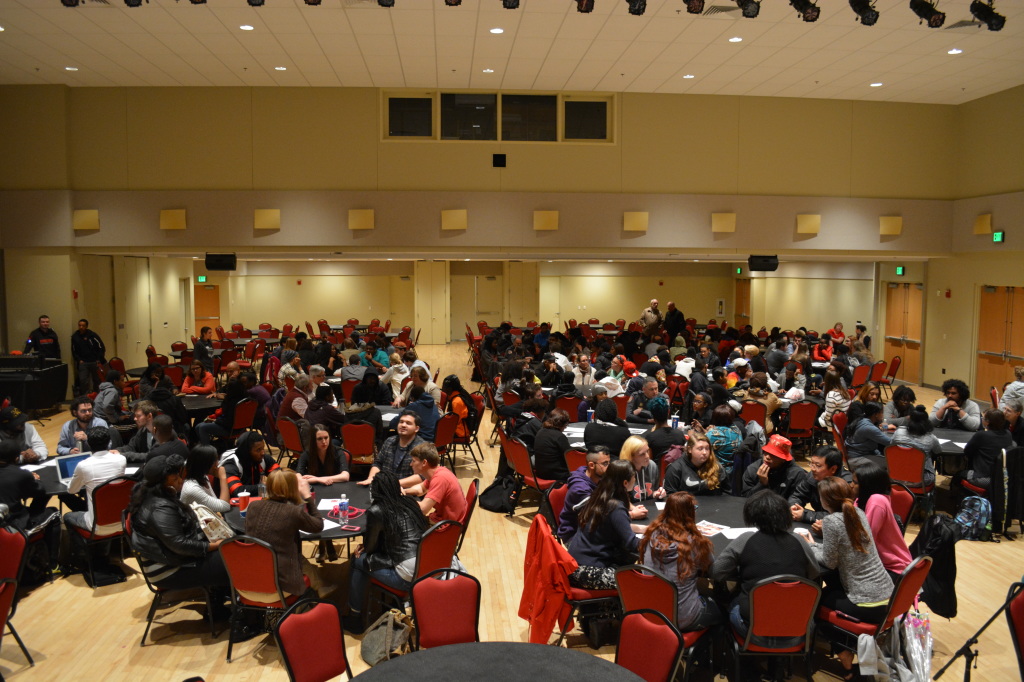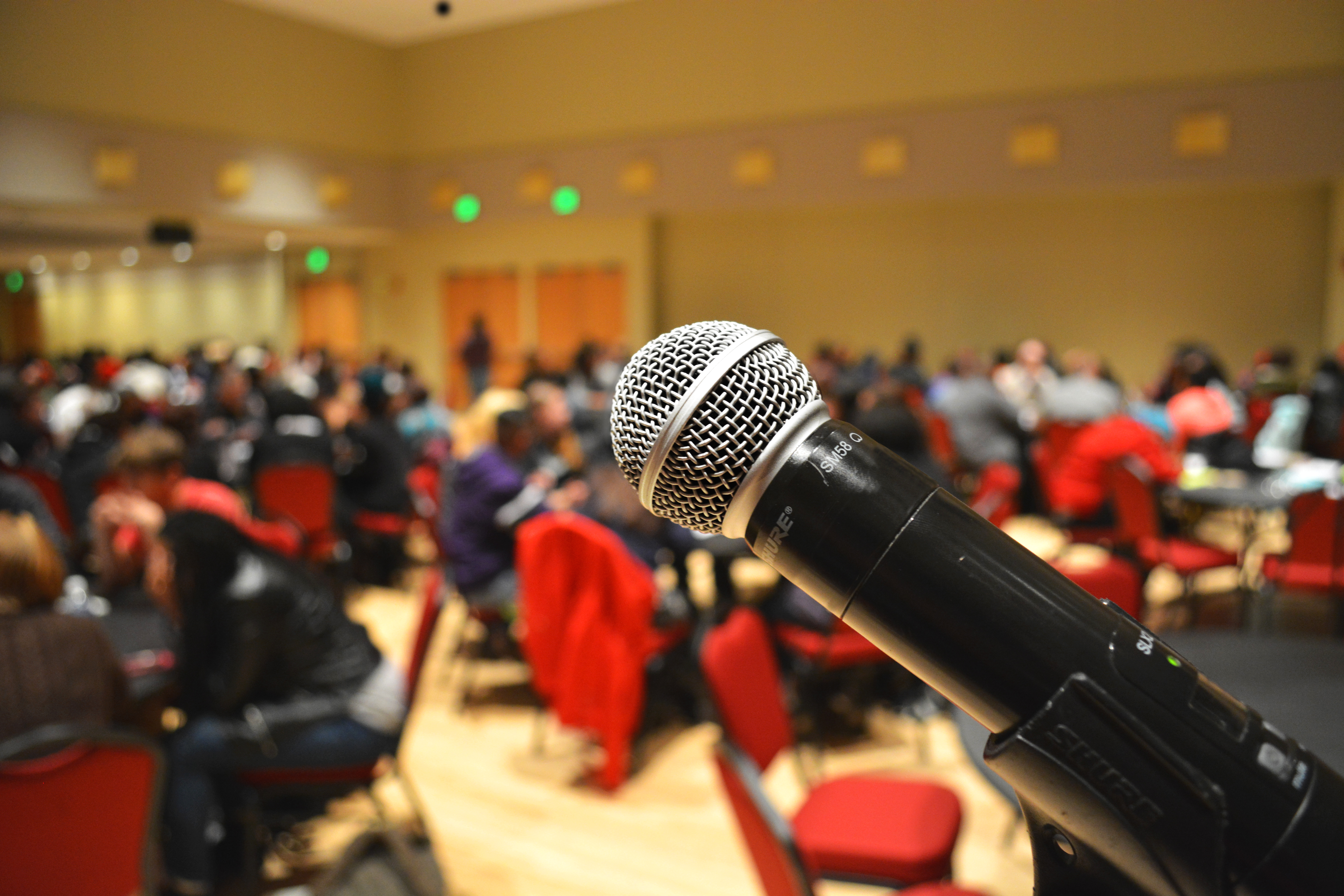“Listen and Be Heard”: ‘Frostburg Cares’ Attracts Crowd, Fosters Dialogue
“This isn’t a white problem. This isn’t a black problem. This is an American problem.” This statement, made by Frostburg State University junior Omar Taylor, accurately describes the climate and context of “Frostburg Cares,” a university event held on Thursday night in response to the ongoing unrest in Baltimore and around the country following the death of Freddie Gray.
The ARMAH was packed Thursday night as students, faculty, staff, and members of the community came together to participate in the event spearheaded by newly-appointed Interim President and current Vice President for Student Affairs Tom Bowling, who kicked off the evening by emphasizing the opportunity “for individuals to be heard and not to be talked at.” Indeed, the evening proceeded with an air of respect and deference to students and the various emotions and perspectives in the room.
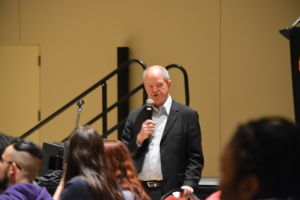
The round-table event initially posed coordinators with the “wonderful challenge,” according to Diversity Center Director Robin Wynder, of finding sufficient facilitators for the number of students. An impressive turnout was present at the commencement of the program, which saw a healthy trickle of individuals flow in as the evening progressed.
The dialogue was an administrative effort to help students struggling with the “pain, fear, anxiety, and confusion” of recent events in Baltimore and around the country express these sentiments in a “safe” environment. Dr. Bowling emphasized the need for participants to actively exchange perspectives, stating: “first, look to understand and, then, as you seek understanding, then it is time for your viewpoints to be understood.”
Wynder set boundaries for the evening by seeking student assistance in determining “ground rules,” which included maintaining mutual respect and avoiding personal attacks. Bowling acknowledged that the “events in Baltimore and this evening’s discussion will bring up issues for many,” considering the large amount of students and staff on campus either hailing from Baltimore or with family, friends, or colleagues in Maryland’s largest city. Representatives from FSU’s Counseling and Psychological Services were present at the event and available for counsel.
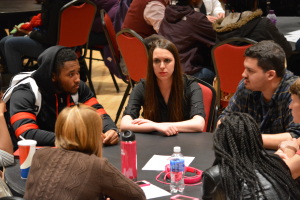
Student Government Association President Katelyn Currier provided a statement, addressing students and offering support in turbulent times. President Currier requested that students “remain calm and maintain a level of understanding” throughout the evening’s progression. The entire SGA Executive Board, including the Vice President, Treasurer, and Secretary were in attendance.
Currier was followed by newly-appointed Black Student Alliance President Shaniya Johnson, who condemned the recent vandalism on campus and announced an upcoming partnership with Visual Arts professor Susan Dodge, in which students will be given the opportunity to positively express themselves artistically. Johnson urged students to not travel to Baltimore in the coming days, describing it as “not the best option.” Johnson stated that students who live in Baltimore are safer on the FSU campus as unpredictable events continue to occur in the city.
After the initial speeches provided by Johnson, Currier, Bowling, and Wynder, the event was turned over to student facilitators and the participants, themselves. Discussion at the round tables focused on the origins of the current events (including the socioeconomic history of Baltimore and similar urban centers), the nature of the relationship between law enforcement and minority populations, and what potential steps could be taken to find solutions that tackle the dynamic issues of race relations and justice.
Discussions consistently criticized recent media coverage of instances of alleged police brutality, citing skewed reporting and the tendency to focus on violence instead of peaceful protests and productive change in an effort to sensationalize the stories nationally.
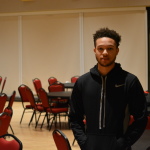
The personal stories of some students found their way into the dialogue as emotions simmered in the room. One student in particular, sophomore Chris Griffith, cited his firsthand experience as a Baltimore native as evidence of a “system” of institutionalized racism in law enforcement. Griffith passionately detailed an experience in which he was detained and accused of attempted burglary while playing basketball in the gymnasium of a public school. Griffith, in contrast to BSA President Johnson, called for the university to send students to Baltimore while the political climate surrounding Freddie Gray’s death plays out, responding to suggestions of inviting Baltimore pastors to FSU with the statement, “we should be the ones going to Baltimore.” The Bottom Line spoke with Griffith after the dialogue, who was “definitely impressed” with the event. Griffith is a BSA member and will be returning to Baltimore this weekend to participate in a “300 Man March,” a self-described “demonstration against violence.”
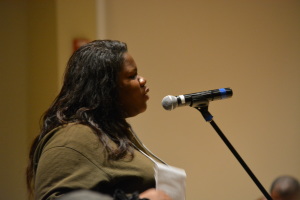
Other students attempted to discuss what they perceived to be the common denominator in the recent string of alleged police brutality, protests, and riots across the country. One student discussed the need to address the “gun culture” present in America, stating that we “turn to guns to solve our problems” and that many individuals were “glad [the Baltimore rioters] didn’t have guns.” Another student, China Pinkney, stressed the importance of education, stating, “everything comes down to education.” Pinkney suggested that primary education should focus on educating youth about law enforcement, the legal rights of American citizens, and the appropriate way to interact with police officers. Other students called on all citizens to utilize their constitutional right to vote, urging students to vote for political candidates of the younger generation, claiming that older generations are more prone to the issues contributing to these current events, including racism.
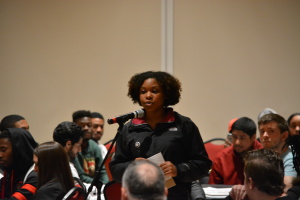
FSU student Jahree Sosa described the need for more mutual understanding in America, urging individuals to “teach compassion, please.” Sosa proposed the planning of future campus events that would continue to call attention to the issues of police brutality and the disproportionate representation of minorities in the American judicial system. At such events, Sosa requested that campus police be present to display solidarity. Sosa praised Administrative Lieutenant John Ralston, in particular, as an exemplary police officer. Both Lieutenant Ralston and Police Chief Cynthia Smith were present.
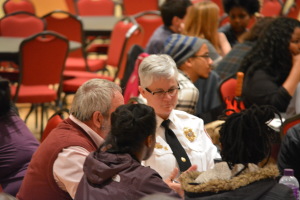
The Bottom Line spoke with Dr. Bowling at the conclusion of the event. Bowling stated that “we had hoped to create a safe space for students to express their concerns, outrage, and ideas for constructive action. We got that. It was clear that a great many of our students are deeply impacted by the events in Baltimore.” When asked if the administration plans to host another event of this magnitude, Bowling stated that this would be dictated by the need for an event, based upon student requests and any potential developments in the Freddie Gray case.
Freddie Gray’s death and the ensuing protests and violence in Baltimore have sparked something of a national discussion on race relations and the judicial system, described by some as a debate that hasn’t seen such action since the turbulent and violent 1960’s. When asked if he believes that FSU provides a safe and inclusive learning atmosphere for all individuals, including minority students, Bowling stated that the “growing diversity our campus has experienced over the last several years has really made the environment more welcoming to many students.”
The Frostburg State campus has, indeed, witnessed it’s African American student population dramatically increase in recent years. When asked if he believes that the faculty and staff of FSU are representative of this demographic shift, Bowling said: “No. This is one of our real challenges. It continues to be something that is examined in terms of recruitment and representation.”
The Bottom Line asked Bowling if he had anything he would say to students who did not attend Thursday’s event. Bowling believes that “the students who did not come… missed a real opportunity to hear from students who live in neighborhoods most affected by recent events. To hear their experiences – this is something that I am truly taking away from this.”
Stay updated as the university continues to provide resources to students as the events in Baltimore and around the country continue to unfold. Follow The Bottom Line on Facebook and Twitter for the most recent reports.
